'We shall raise our voices higher and sing of Trinity'
The College Song
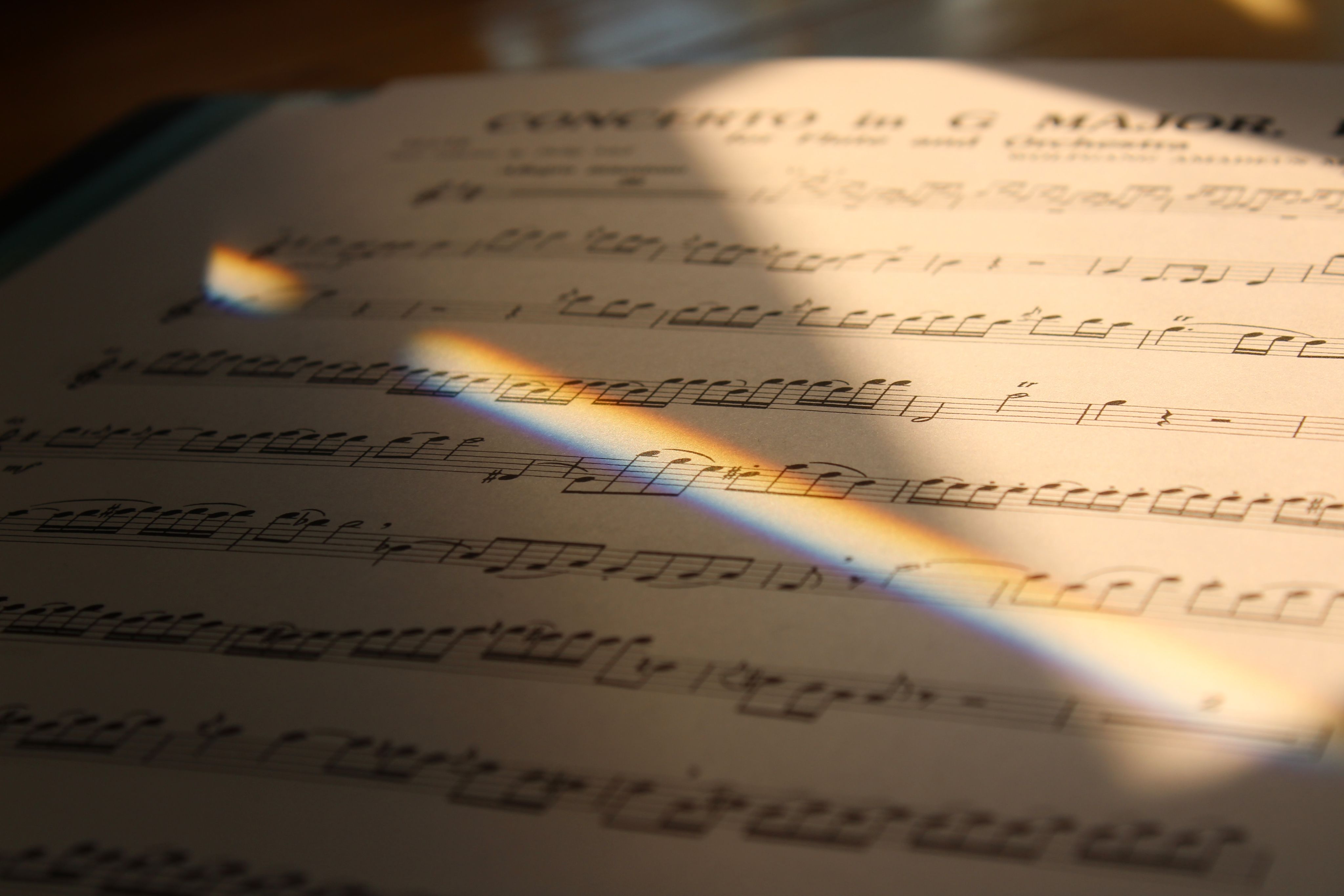
When we walked into the Dining Hall and everyone was cheering and spooning us in, and we all sang the college song together. That was really nice.
Gather in the Dining Hall at a commencement dinner, a valedictory dinner, or various other occasions during the year and you'll hear the fifth Warden Revd Dr Evan Burge's poetic words set to the hymn "Thaxted", part of the "Jupiter" movement from Gustav Holst's 1916 orchestral suite, The Planets.
For recent generations of Trinity students and alumni, Burge's college song encapsulates their Trinity experience, unifying the student community in our efforts to excel.
In the dark, initial months of the COVID-19 pandemic in late 2020, Warden Ken Hinchcliff reflected that two lines from the college song 'particularly resonate in this COVID year; capturing essential elements of Trinity that have been so important as we have risen to the challenges presented by the pandemic.'
Those lines spoke of two essential, defining aspects of the Trinity:
The College Oak stands spreading
Forth its branches to the sun.
And here are joy and laughter
And loyal friends as well.

Burge's choice of focusing on the College Oak – emblematic of enduring steadfastness – coupled with the virtues of an intimate community like Trinity’s were deliberate and captured well the spirit he was intentionally seeking to foster.
Trinity had moved to co-residency five years earlier, and while the transition had been relatively smooth, like all periods of change it was not wholly without its challenges.
Cultures takes time to form; and in some cases, to reform. Commenting on the results of a student questionnaire at the end of the 1970s, Burge knew that a 'significant number … regretted so much emphasis on drinking, and a lack of respect for women.'
Some of what Burge was seeking to address was, albeit inadvertently, enshrined in the opening line of the existing college song:
Fill up your foaming glasses, boys, and drink the bumper toast
Of Trinity, the dear old Coll., the place we love the most.
We’ll sing a song and make it ring from Ormond to the coast,
A song of the Fleur-de-Lys and Trinity.
Wind the clock back before the early 1980s, and it is this version of the college song that tugs at the sentimental heartstrings of a different generation of Trinity alumni.
At the 1978 Fleur de Lys dinner held in the Dining Hall, upon the Warden proposing a toast, the college newsletter records that ‘an older generation, led by 'Taffy' Jones (TC 1957), gave a full-throated rendering of the college song. Instantly Stephen Cordner (TC 1971) jumped to his feet to lead a college war-cry in the current style, "Give us a 'T', give us an 'R' ….'
'The new anthem is generally preferred', Burge commented to the College Council in 1979, 'but many think there is a place for the old song as well. Should be taught to freshers.'
Twelve respondents wanted to see both songs scrapped.
Fill up your foaming glasses, boys, and drink the bumper toast
Of Trinity, the dear old Coll., the place we love the most.
We'll sing a song and make it ring from Ormond to the coast,
A song of the Fleur-de-Lys and Trinity.
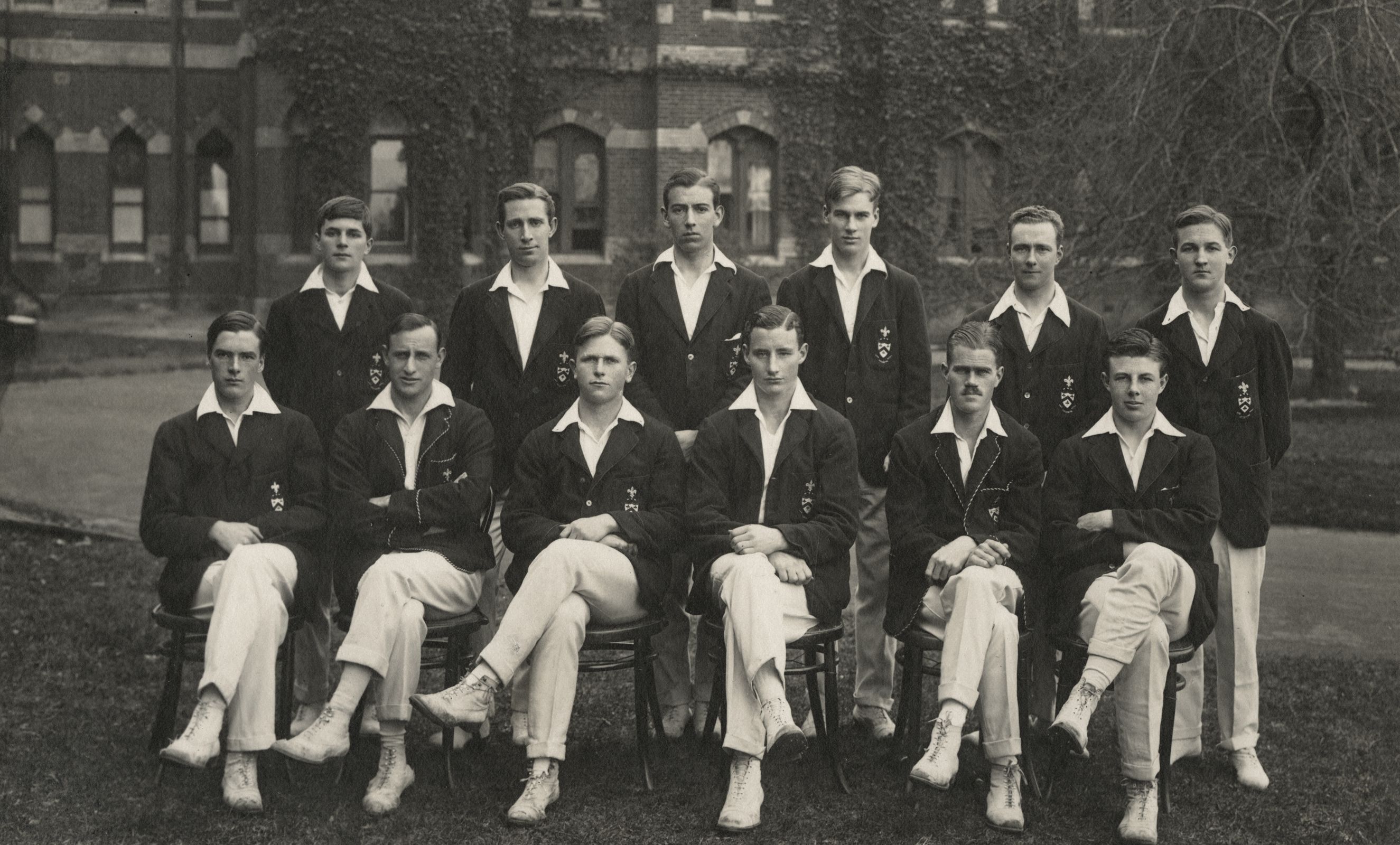
Dark green for ever!
The earliest college songs recorded at Trinity begin appearing in the early 1880s, as the young, then male-only college began to develop a sense of identity.
In 1881, a neighbour - and, on the sports fields, an adversary - had appeared to the immediate north in Ormond College. Intercollegiate rivalries provide fertile ground for identity formation; tribal groups mark themselves in distinctive colours, songs and war cries give voice to those traits that distinguish one community from the 'other' on the other side of the fence.
Among the earliest of these is the College Anthem of 1883. Penned by an unknown author and to a melody long forgotten, the opening stanza begins:
We haven’t got a bugle, boys, but let us have a song,
Sing the chorus, all of your who round this table throng;
Sing it with such spirit as would frighten the poor old strong,
If he were passing by the College
Chorus:
Hurrah! Hurrah! We’ll shout for Trinity,
Hurrah! Hurrah! The College that shall be
In future as it even was the summit of the tree,
If men work together for the College.
By 1886, two law students were creating a reputation for themselves at Trinity as college lyricists, putting tune to prose in a number of 'anthems' that were being sung in the Hall and the student common room, or whistled down the Clarke cloisters as students dragged their heels back to bedrooms following a college 'smoke night'.
Cousins William Charles Lewers (TC 1882) and Felix Cecil Cowle (TC 1883) were responsible for the anthem written for a dinner held on 29 April 1886, to be sung to the 'Song of the Mikado' from the Gilbert & Sullivan comic operetta that had been performed for the first time a year earlier in London. In August 1887, the pair again put pen to paper to compose a song for the Smoke Night Concert, again to a Gilbert & Sullivan melody, this time 'The Ape & the Lady' from Princess Ida.
A freshman once to College came
Resolve to further his schoolboy fame
He swore to shine as a classic star
As he kissed good-bye to his fond mamma.
But it would not do -
His scheme fell through,
For lecturers laughed at his Latin prose
And hurled such curses
At his vile Greek verses
That he groaned in sight – translations throes
"I'm not so brilliant as my friends suppose."
With a gift for words, little surprise that both young men were active participants of the Dialectic Society. Lewers took out the Vice-President's Medal for Essay Writing in 1883 and the President's Medal for Oratory in 1888, the same year he won the Wigram Allen Prize. Two years later, he entered the Victorian Supreme Court Roll of Barristers.
Following his cousin, Felix too won the Vice-President's Medal for Essay Writing in 1884 and the Wigram Allen Prize the same year.
Close to half a dozen early college songs are attributed to the pair, who clearly had a talent in capturing the student experience in song.
But it was their 'College Song' for an Old Students Dinner in April 1888 that soon became recognised as the college's official anthem.
Sung to the tune of Italian composer Luigi Denza's eight-year-old Funiculì, the song's chorus would continue to be published in the opening pages of the student Fleur de Lys magazine for the next four decades, almost up until the eve of the Second World War.
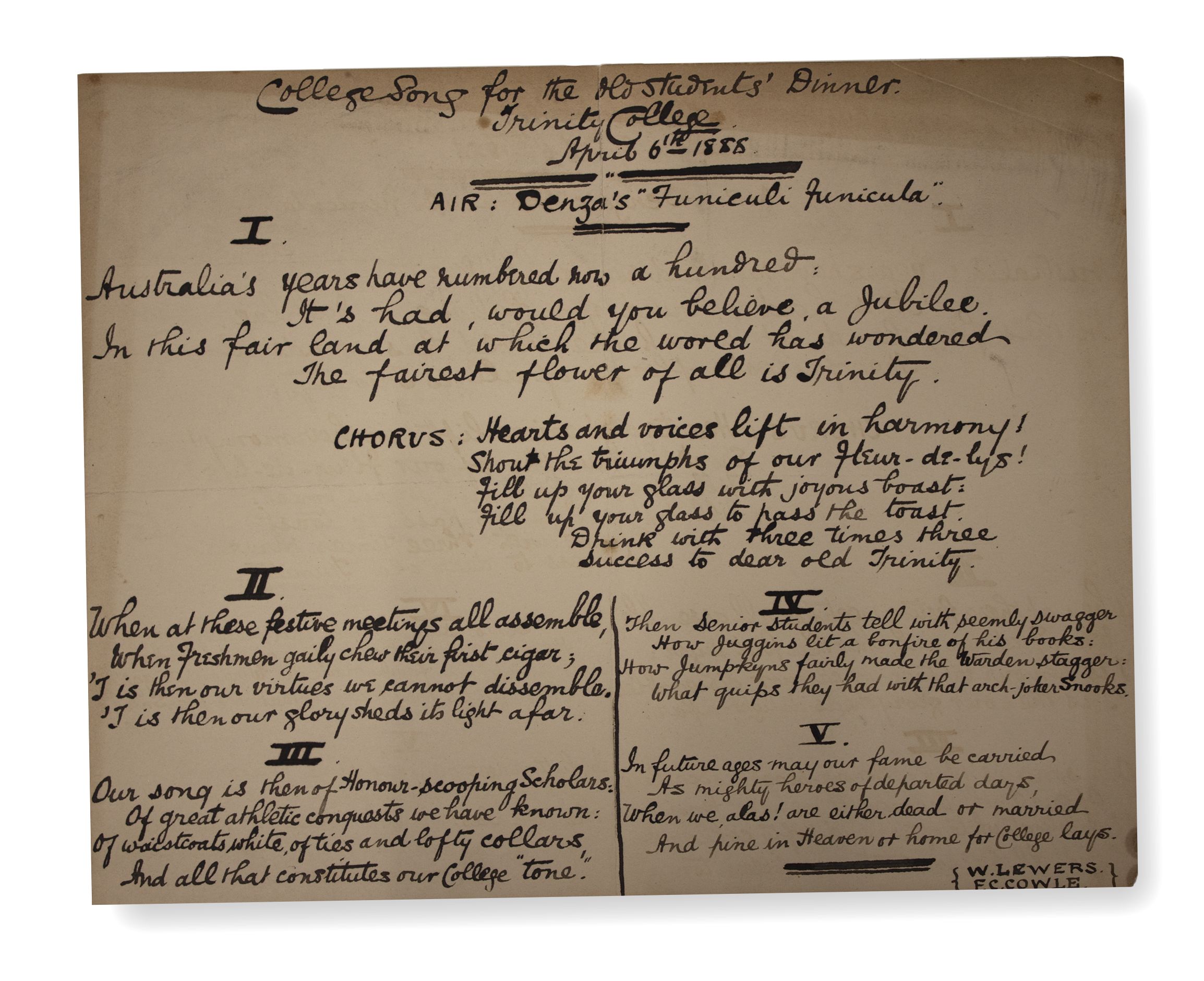
Lewers' and Cowle's 'College Song' for the Old Students Dinner, 1888
Lewers' and Cowle's 'College Song' for the Old Students Dinner, 1888
Indeed, almost a century later, in the early 1970s, the college newsletter wrote that it 'would be pity if that old song, "Hearts and Voices", should disappear.
For many years it was sung regularly at dinners and until about 10 years ago the veterans did their best "to shout the triumphs of our Fleur-de-Lys" but, as their numbers dwindled and their vocal cords grew weaker, they became disheartened.'
Lewers' early death in 1927 was deeply felt by the College community who grieved the loss of 'one of the most distinguished students'.
The Fleur de Lys expressed sorrow, noting that, as 'a writer of prose and verse, he was witty and graceful, sometimes cynical, but never unkind. Many of the college songs come from his pen, and topical verses composed and recited by him at Bar dinners often reached the apex of happy inspiration.'
A bronze plaque was designed by the noted arts and crafts era Melbourne architect Harold Desbrowe Annear and installed in the College Chapel, with the apt line expressing the sentiments of many of his collegiate contemporaries:
'A greatly loved member of this college, in whom literal learning and histrionic and literary gifts were informed with the charm of a gracious personality.'
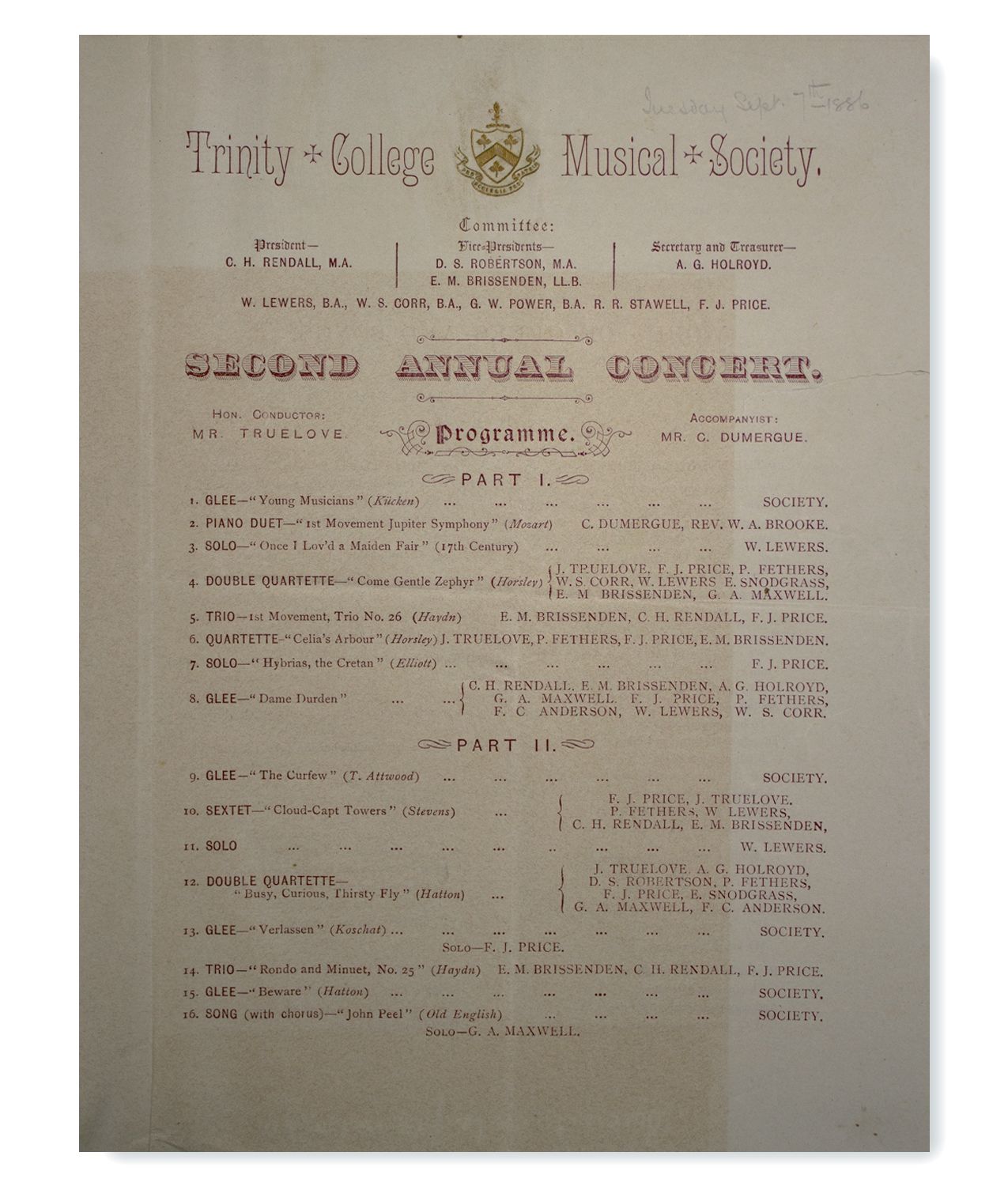
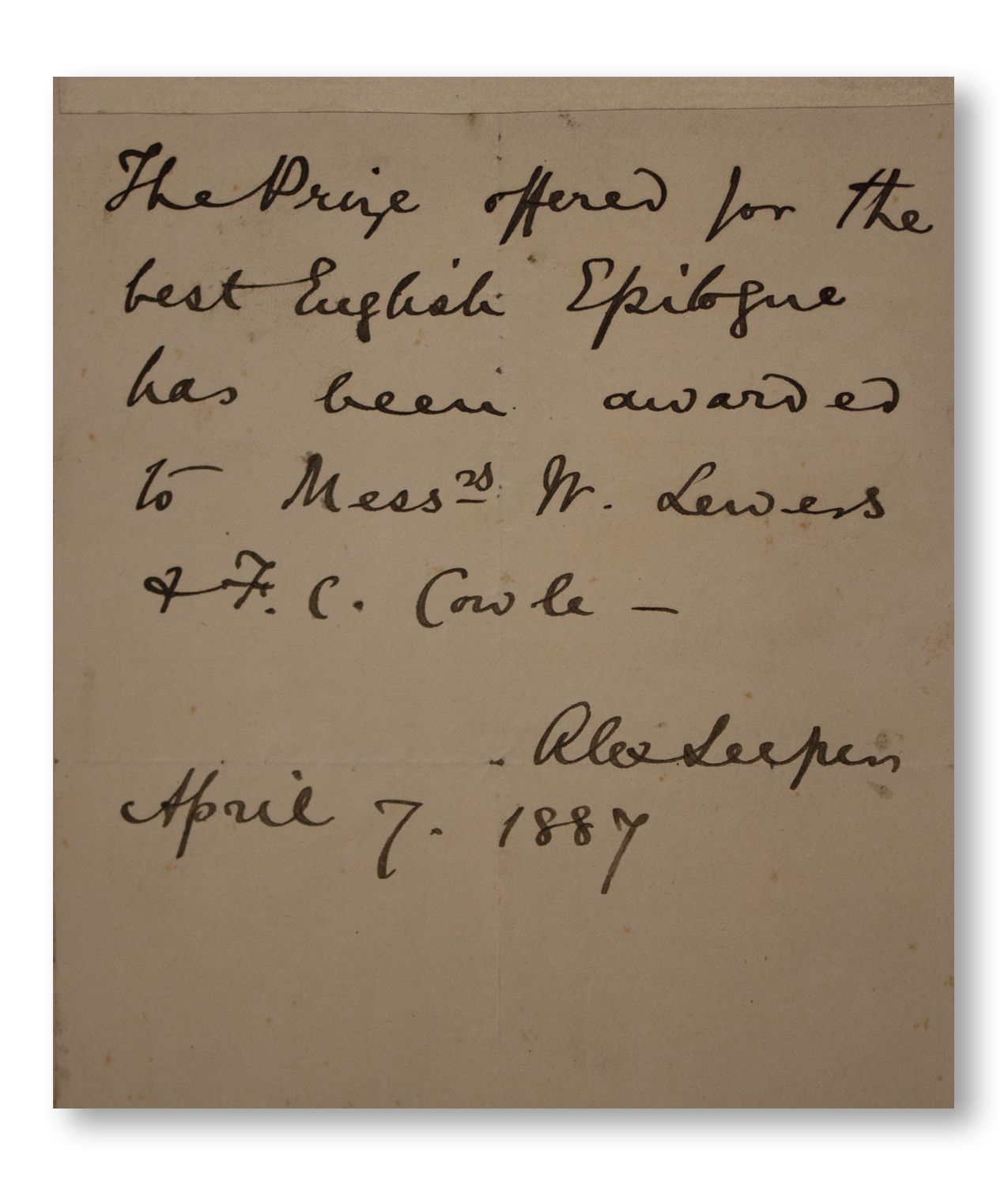
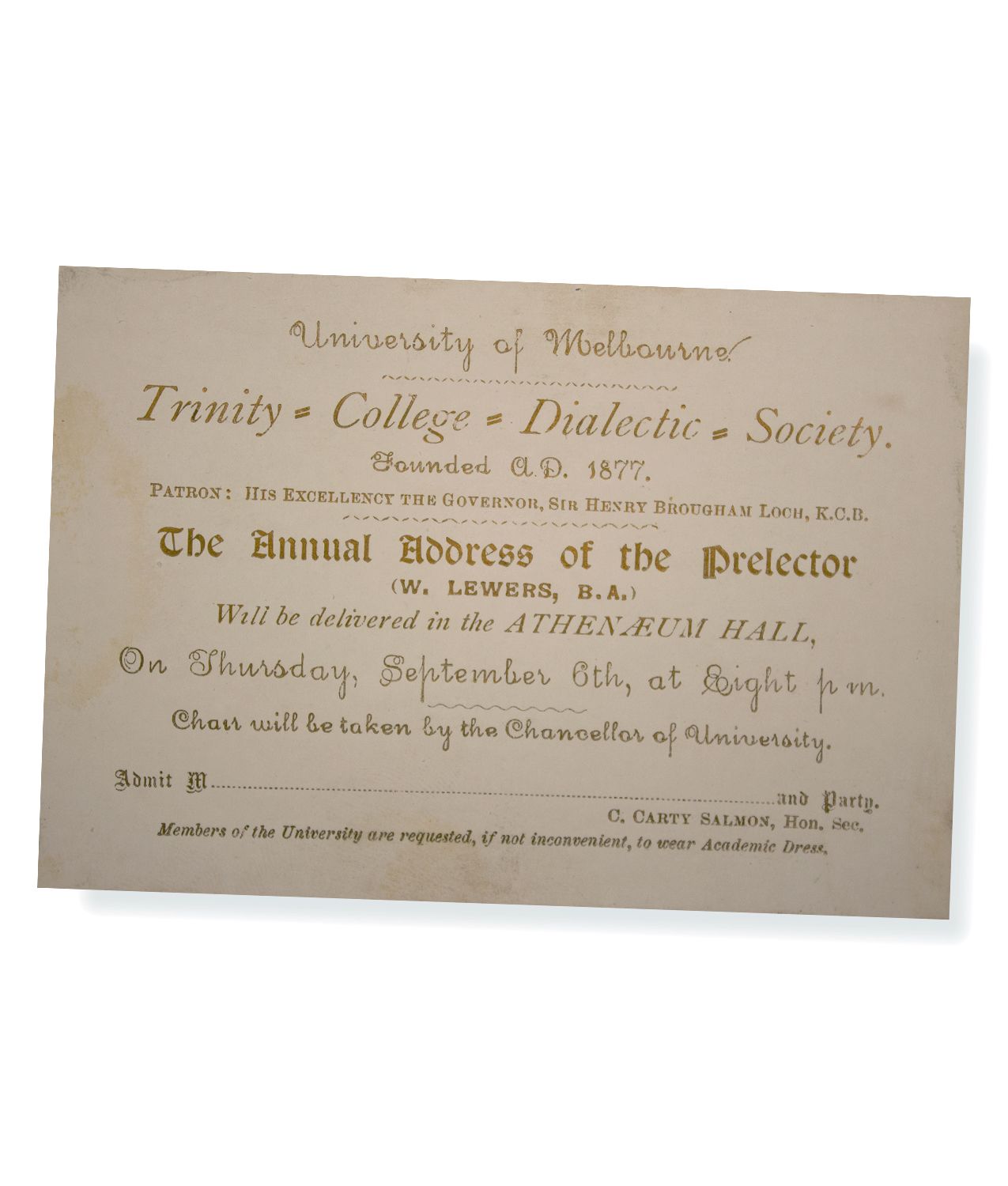
Hearts and voices lift in harmony!
Shout the triumphs of our Fleur de lys!
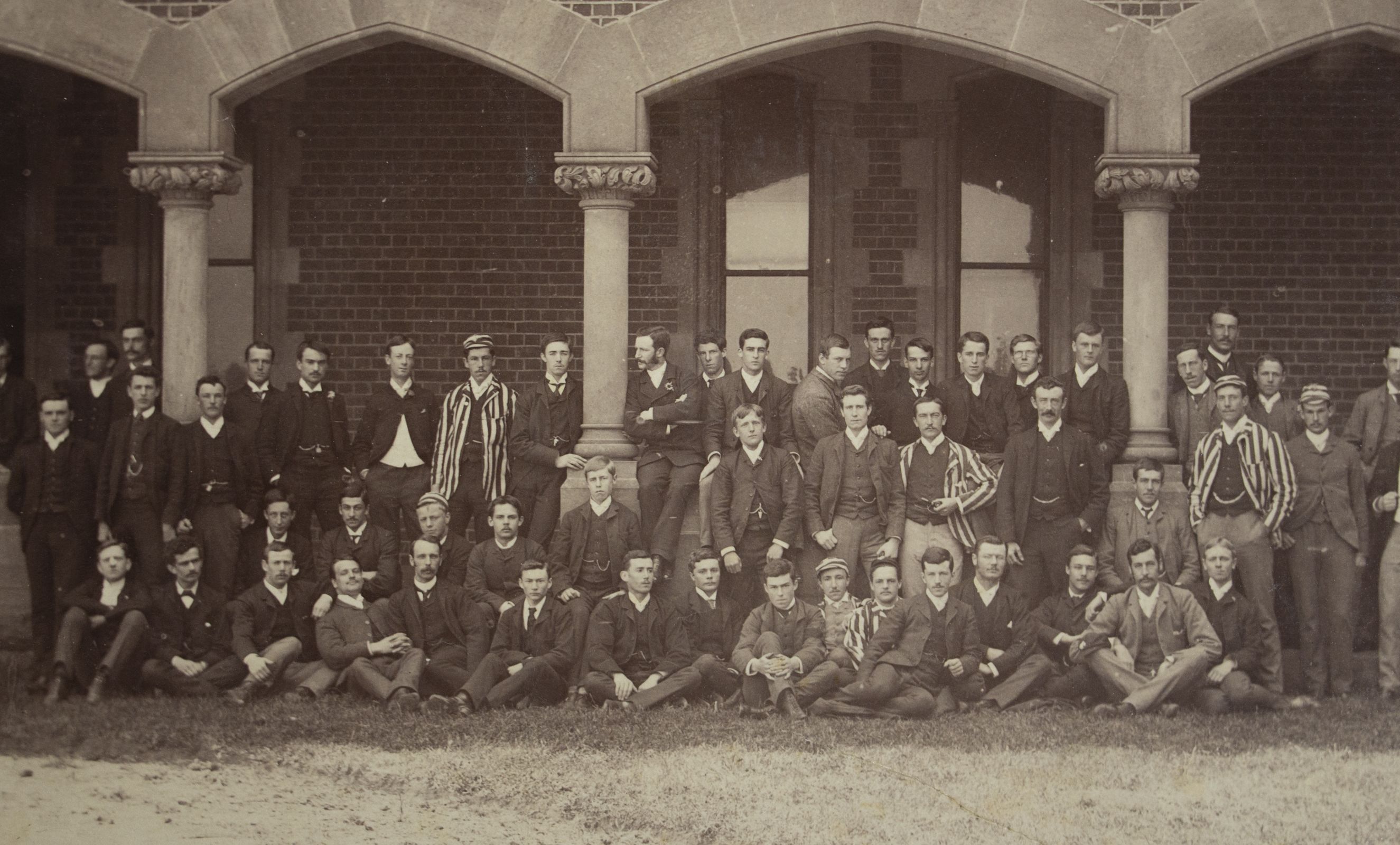
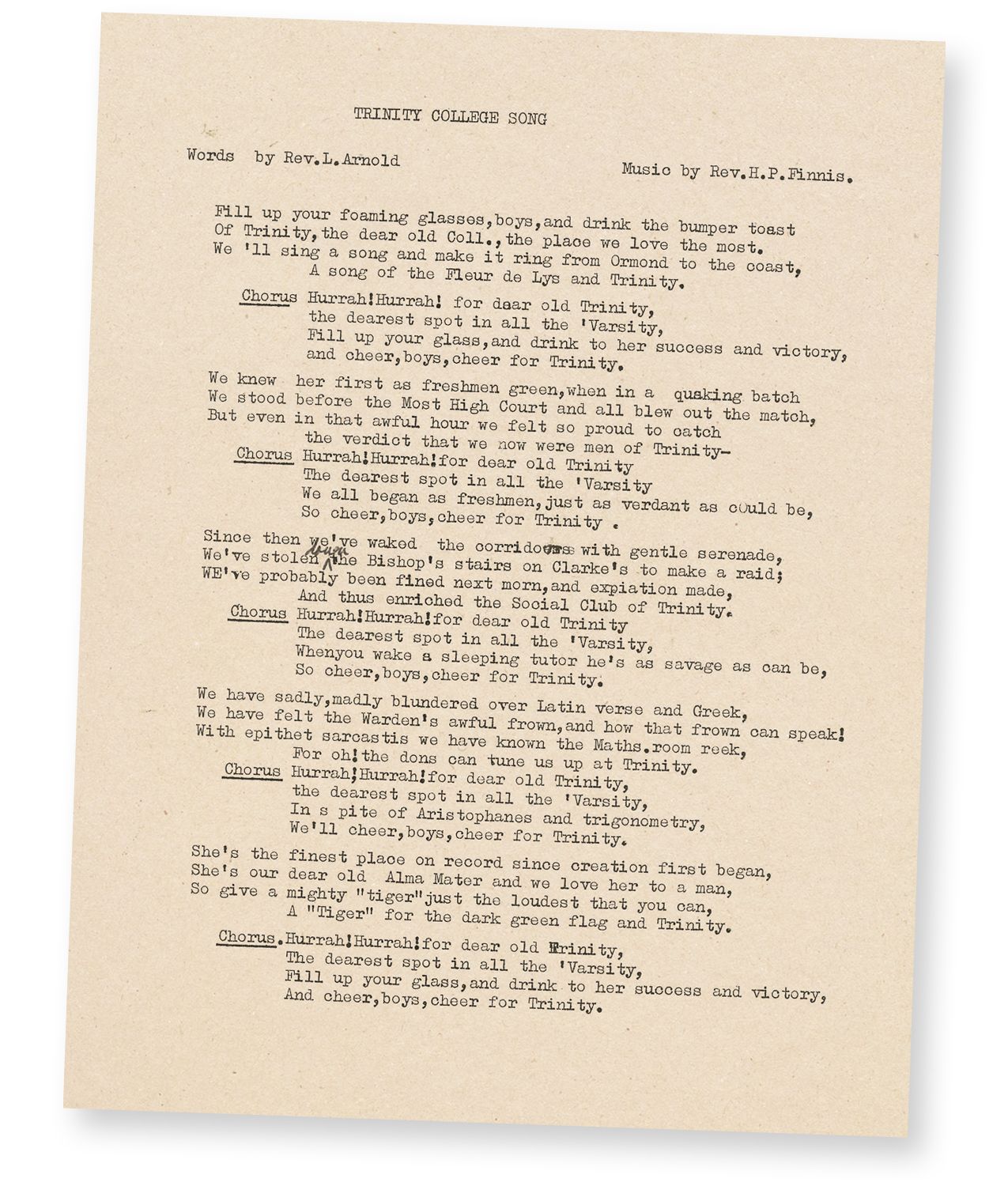

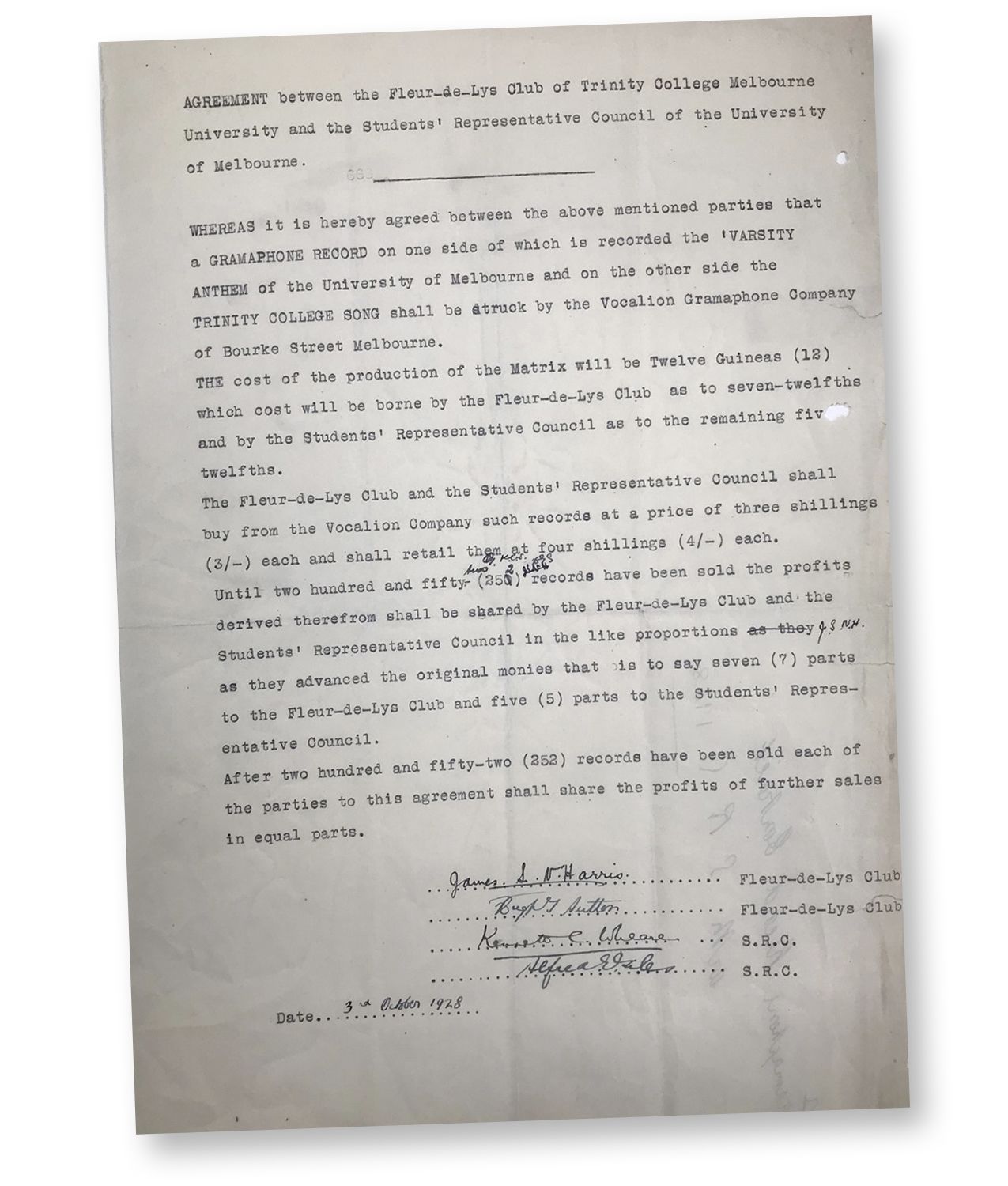
A new song for a new century
At the turn of the century, another college student rose to the fore to pen a new, and – as it happened – long-lasting college song; one that would seemingly compete with Lewers' and Cowle's "Hearts and Voices".
Like Creswick-born William Lewers 20 years before him, Leonard Arnold (TC 1901) was a country lad from the central Victorian goldfield town outside of Ballarat. The son of Creswick's vicar (Lewers was the eldest son of the manager of the Bank of New South Wales in the township), Arnold had been educated at Hamilton College in Victoria's Western District before coming into Trinity on the Perry Scholarship.
A well-rounded student, Arnold had both a brilliant scholastic career at Trinity College and filled up his bedroom with numerous sporting trophies from various athletic achievements.
In 1904, he won the varsity one-mile championship and in September that same year was elected prelector of the college's Dialectic Society for 1905.
Having studied theology as well as a Bachelor of Arts, Arnold was ordained late the following year before being licensed to the curacy of St Johns, Melbourne, in April 1906 - a position, The Ballarat Star observed that was deemed 'highly creditable', being that Arnold had only been ordained six months earlier.
While the particular circumstances of the competition remain lost to time, in 1907 the diversely talented Arnold won the Warden's prize 'for the best College song'. It was performed during 'a most delightful entertainment' dinner held in the Dining Hall on 14 May at which the Warden Alexander Leeper, tutors, students and guests were serenaded by college musicians and vocalists, including the Trinity College Glee Club.
The evening was brought to a close by 'excellent musician' alum Frank Maidment's (TC 1901) performance of Arnold's college song, Maidment singing the solo verses with the cohort of students - and many of the guests - enthusiastically joining in the chorus.
The lyrics to Arnold's work were published that year in the inaugural edition of the Fleur de Lys magazine, as the 'Original College Song'.
That same year, college alum Ernest Selwyn Hughes (TC 1883) loaned the college a book containing old College songs, one of which - Lewers' and Cowle's 'Song Written for a Smoke Night Concert', 1887 - was also included in the Fleur de Lys along with Arnold's work.
It seems likely that Arnold, with access to the work of early student songsmiths, drew upon several lyrics from the 1880s when shaping his rousing chorus, familiar to many past alumni.
Hurrah! Hurrah! For dear old Trinity,
The dearest spot in all the ‘Varsity.
Fill up your glass, and drink to her success and victory,
And cheer, boys, cheer for Trinity.
Horace Finnis (TC 1904), himself a talented musician, set Arnold's words to a musical composition of his own, providing the melody that the subsequent six decades of collegians would come to know as the college song.
Finnis himself would be ordained an Anglican priest in 1908, commencing that February as assistant curate and choirmaster at St John's in Toorak, the beginning of a long and recognised career with both the church and music.
Not all were convinced by Arnold's efforts however.
Writing in 1927, one contributor to the Fleur de Lys magazine suggested that there 'are those who consider the college song neither appropriate nor beautiful, and in a sense they are right.' But as the author continued:
'Some day we may adopt a song more rousing in its appeal; but there's a spirit about any honest College song, rising superior to mere words or tune. Emotion again, you see.'
Trinity on vinyl
In 1928, embracing the emerging technology of the age, Trinity's alumni body, the Fleur de Lys Club – together with the Student Representative Council of the University of Melbourne – entered into an arrangement with the Vocalian Gramphone Company to record the college song, alongside the University's Varsity Anthem, on a double-sided record.
Performed by the Southern Choral Society and retailing for four shillings each (approximately $6 in today's terms), the records were not made available to the broader public, but 'to those who have at some time been connected with Trinity or the Janet Clarke Hall'.
It remains unknown how many records were eventually produced by the Vocalian Company. However some indication is offered by the fact that both parties – the Fleur de Lys Club and the University – had agreed not to share any profits until 252 records had been sold, in order to recover costs.
A copy of the original audio recording survives today in the National Film and Sound Archive of Australia. It reveals a highly recognisable, but equally distinctly different melody in these early decades of the college song than so many alumni from later decades after World War II would be familiar.
Across almost the full breadth of the college's 150 years - from Lewers' and Cowle's "Hearts and Voices" of 1888, Arnold's 1907 'College Song', to Warden Evan Burge's 1979 adaption to Holst's The Planets - college songs have playing an important role in both shaping an defining the culture and community of Trinity College.
Upon this milestone anniversary, following the challenges of the last few years, it is timely to reflect on the final lines in the often unsung second verse of Burge's college song for they ring with a poignancy as relevant today as they were 40 years ago.
In friendship bind out hearts in one, a diverse unity,
And make us worthy of your name, O glorious Trinity.
'Trinity college song', performed by the Southern Choral Society, 1928 | National Film and Sound Archives, Australia, 286027
'Trinity college song', performed by the Southern Choral Society, 1928 | National Film and Sound Archives, Australia, 286027

Dr Ben Thomas, Rusden Curator, Cultural Collections curator@trinity.unimelb.edu.au





